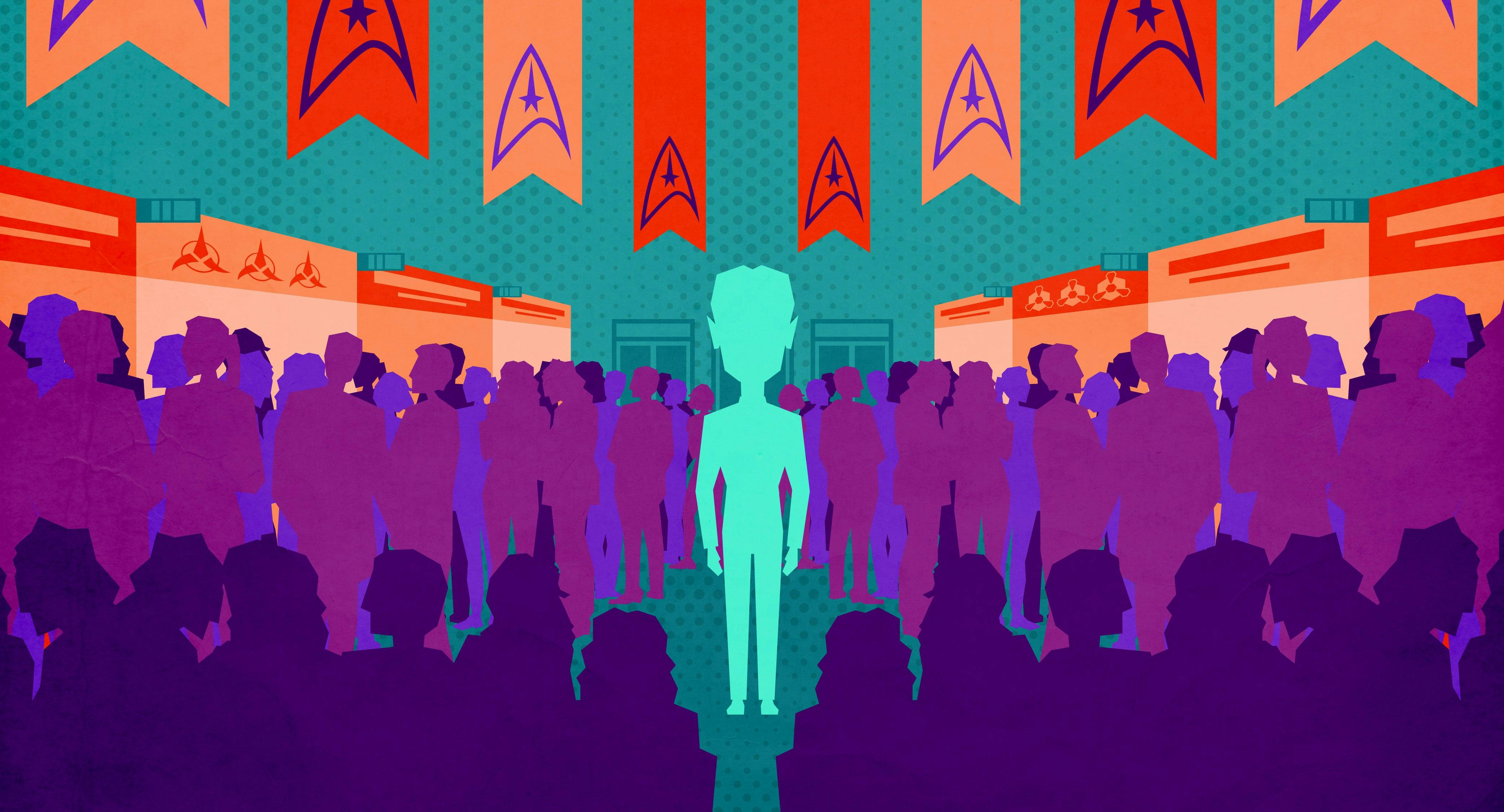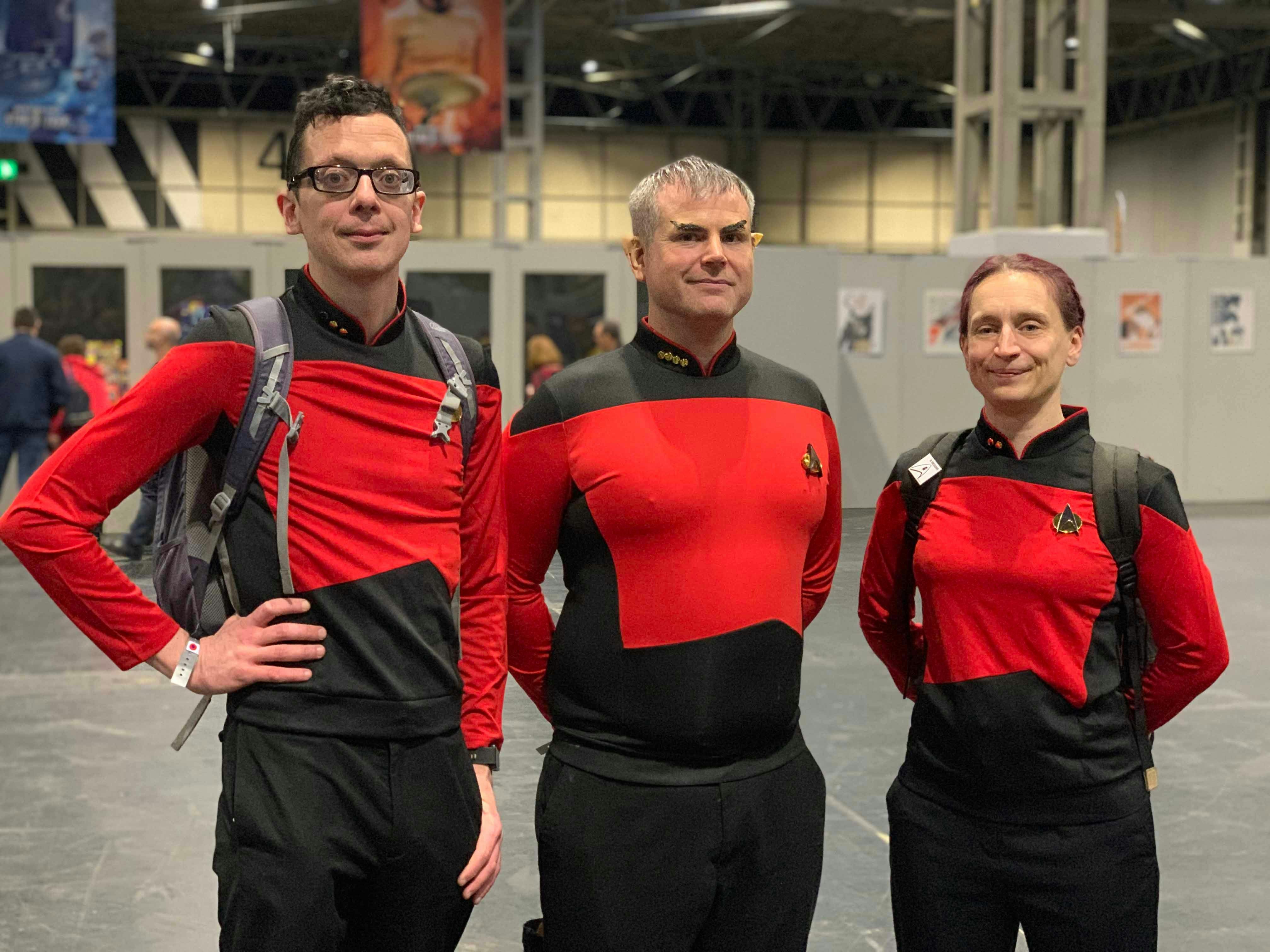Published Oct 6, 2021
On the Worst Day of My Life, I Went to a Star Trek Convention
"Despite feeling so isolated that day, Star Trek remains powerful because it’s always been something I’ve shared with others."

StarTrek.com
Star Trek would not be Star Trek were it not for conventions. The show has had a presence at sci-fi events since its original air date, and since the early 1970s fans have gathered in increasingly large numbers to share their love for the show in all its various iterations. Conventions are a place to interact with other fans, meet the stars of your favourite episodes, and admire the creativity of the fandom. But the day I attended a Star Trek con was on the worst day of my life, and I’ve spent the last four years reflecting on how that day and Star Trek itself have affected my struggles with mental illness.
Have you ever had an unwanted thought, one dark and twisted, pop into your head completely out of nowhere? You wonder what would happen if you say something obscene in front of an audience, if you hurt someone close to you, or if you jumped in front of a train at a busy station? If you have, it’s not because you’re secretly a terrible person. They happen to everyone, and they’re called intrusive thoughts. They might frighten us for a moment, but we can easily shake them.
But what if you can’t? What if they pop up every moment, what if you fixate on them, what if they make you spiral into panic, because surely only a bad person would have such horrible thoughts in their head? This is the life of people who suffer from obsessive compulsive disorder.
STLV Looking Back - The Cosplay Parade
I always had anxious tendencies growing up, but just before my nineteenth birthday, they completely overwhelmed me. Suddenly my head was filled with unstoppable fixations on disturbing images and laser-focused dissections of my past actions. I was condemning myself for thoughts I couldn’t control.
At this time, my close friend and I had arranged to visit Destination Star Trek, Europe’s largest Trek convention, in Birmingham, England. I would catch a flight from my hometown in Scotland and we would spend a day in lofi Kirk and Spock costumes, taking photos with cosplayers and meeting our favorite actors. By the time the weekend rolled around, I was in a bad way, but decided to go ahead with the trip. I hoped a huge celebration of our love for Trek would sufficiently distract me, and didn’t want to miss out on something we put a lot of energy and money into. But I didn’t realise how much of a strain it would be displacing me from my home and putting me in exclusively unknown environments. As we queued to get into the convention, I had the troubling realization that I was making a terrible mistake.
I don’t know how a space manages to be vast and claustrophobic at the same time, but the hall where Destination Star Trek was set up achieved this effect. Fans lined up around two full-scale Enterprise sets sat back to back in the middle of the hall. Rows of tables adorned with blown-up pictures of characters were pushed against one wall opposite a maze of dealers’ tables and costume displays. Stages ranging from intimate to immense were set up in the corners. Hundreds of Trekkies wearing Borg costumes, Starfleet uniforms and Andorian make-up milled about, taking in sights and gathering around exhibits. And at the centre of it was a young man, dressed up as Spock, on the verge of tears because of what was going through his head.
Two factors made my experience worsen as the day went on. At this point, I hadn’t been diagnosed with OCD, so I didn’t know my barrage of intrusive thoughts was a symptom of mental illness. Instead, I thought the contents of my head truly made me a monster, and if I shared what I was thinking with anyone they’d rightfully be disgusted with me. So, I opted to be quiet, push my thoughts down, keep them to myself. Like the wise Vulcan I was dressed as, I was experiencing a turbulence of emotions, but I had chosen to repress them.
As well as not being able to talk through what I was suffering, my situation was worsened by a lack of distractions. This may sound implausible (I was at Europe’s largest Star Trek con!) but regular con-attendees will know there isn’t much to do at a convention for free. The talks, photo-ops, and autographs all cost, and while there’s a sliding scale of price tags, the expense of even a few small activities quickly adds up. At the time, I was a student with little disposable income, most of which had already been blown on plane, train, and admittance tickets. By the time I had paid my way into the room, I had barely any left to spend.
We bought photos on the Enterprise-D bridge, and entry to the Deep Space Nine retrospective, but most of the day was spent loitering around, looking over dealers’ tables with no intention to buy, and trying to sneak pictures of William Shatner from 20 metres away where security wouldn’t spot us. We certainly weren’t bored, but more idle time meant more time undistracted, and more time swimming around in thoughts that would make me physically twitch in revulsion and fear. The room was packed, but because I couldn’t say how I was feeling or distract myself completely, I felt extremely alone.

StarTrek.com
If there was any saving grace of the day, it was undoubtedly Terry Farrell. Farrell is known to fans of DS9 as the science officer Jadzia Dax, the charismatic and fiercely intelligent Trill, but the level-headed nature of her character didn’t prepare me for what a riot the actor was in person. In both talks we saw her in she would laugh uproariously, speak to fans with warmth and humor, and was more enthusiastic and energetic than you would reasonably expect from someone discussing a show that had stopped broadcasting decades prior.
Even at the low moments, she was terrific. At one point, a microphone had to be snatched off an obnoxious, sleazy fan who wanted to discuss his enjoyment of Dax’s same-sex kiss in ‘Rejoined’. As the moderator tried to wrap things up, there was a horrible awkward silence. But Farrell responded with a passionate retort about how that kiss was not about sexual gratification, but instead about the limitless and universal qualities of love, and she was greeted with resounding applause from the audience.
But despite Farrell’s best efforts, my mental condition deteriorated as the day crept on. I ended up leaving in the middle of the DS9 talk to board an express train back to the safety of my home. Within weeks, I had my diagnosis, starting the long road of recovery, but the fear and shame of that day remained in me for years to come.
It’s curious my experience was such a potently negative one when Trek has proven to have such a positive effect on so many people’s wellbeing. The internet is filled with articles and forums exploring how the show in all its forms helped people cope with mental illness, grief, or how they see the world.
As the years have pushed on, I too have reflected on my relationship with Trek, examining how different series impacted me in unique ways. The ambient, calming vibes of TNG help soothe an afflicted mind, whatever interpersonal and external conflicts flare up in an episode, we know it will be neatly resolved in 45 minutes. The atmosphere of the show is a relaxing one, and it’s no surprise the ‘TNG Ambient Engine Noise 12 Hour Mix’ works wonders for those struggling to fall asleep.
Then there’s DS9, a darker, tenser environment plagued with layered conflict and deep-set trauma. This show taught me while our lives may be littered with unavoidable internal and external problems, we have to confront them head-on and work at our issues bit by bit if we ever hope to find lasting peace. Progress is slow and hard, but we must fight for every little step forward.
But the lessons I took from the shows were never what truly defined my relationship to Trek. What’s impacted me the most is not any specific episode or character, but the company I keep because of the show. It’s the work colleague who lent me his DS9 DVDs to get me hooked on the show, it’s my dad taking me as a child to see JJ Abrams’ ‘09 reboot, it’s my friend and me making ourselves laugh as we invent our own ridiculous spin-off. This is the same friend who stood beside me in the convention hall, the Kirk to my Spock, posing for silly photographs and being there for me while I went through unprecedented mental turmoil. Despite feeling so isolated that day, Trek remains powerful because it’s always been something I’ve shared with others.
When I look back at the lost, lonely Spock in the middle of the convention floor, I wish I could tell him the future has hope. If I stepped into that hall again, not only would I finally be able to celebrate the Trek I love, I’d be proud of how far I had come since I was last there.
Rory Doherty (he/him) is a screenwriter, playwright and film critic, who loves all things Star Trek since he watched First Contact way too young. He currently lives in Edinburgh, Scotland, where he is developing film and play scripts for future production.
